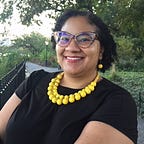Tulsa Massacre Survivors Get Their Say and ‘60 Minutes’ Edited a Black Scientist Out of Her Own Interview
Catch up on the race and racism stories you may have missed
We start this week’s racial news roundup with lessons of the past, as we edge closer to the May 31 centennial of the Tulsa Race Massacre. Some of the massacre’s oldest survivors have just told a House subcommittee about all that was lost beyond lives and property — chances for education, generational wealth, and the sense that American justice could work in their favor. Read on to find out how the sickle cell trait is blamed for Black people’s deaths in police custody, and how a Black man’s devastating accident led to an app that helps people with disabilities find accessible businesses.
Survivors of the Tulsa Race Massacre speak
Viola Fletcher, at 107 years old, is the oldest survivor of the massacre that destroyed Tulsa’s prosperous Greenwood district and killed as many as 300 people. It also destroyed what had been a comfortable childhood for Fletcher. On May 19, days before the massacre’s 100th anniversary, she and her 100-year-old brother told their story to the House Judiciary Subcommittee on Constitution, Civil Rights, and Civil Liberties. “I have lived through the massacre every day…
